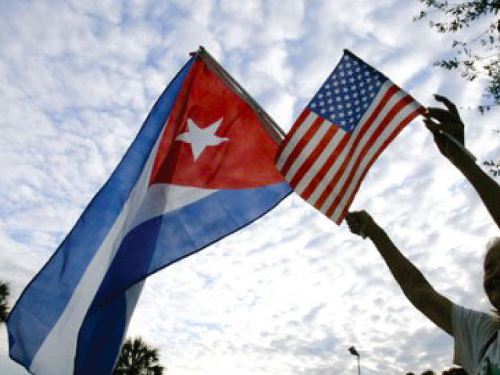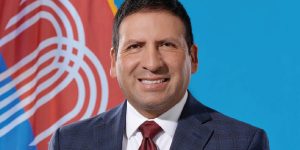El presidente Obama anunció recientemente un deshielo en la relación tensa con Cuba, un vestigio de los días de las antiguas tensiones de la Guerra Fría. El anuncio del Mandatario estadounidense — el cual vino con un canje de prisioneros políticos por ambo países — marca el fin de las prohibiciones formales en las relaciones financieras, diplomáticas y culturales entre las dos naciones.
Para esta edición de “Preguntando en la Calle”, nosotros en Dos Mundos acudimos al público para pregunrtarle su opinión sobre el pivote de Obama con respecto a Cuba.
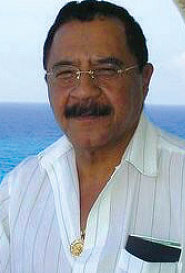
“Estaba llegando el momento de cambiar la política de no contacto y no relaciones diplomáticas. Las cosas están pero ahora que cuando yo dejé Cuba (hace 35). No hay ropa ni artículos de primera necesidad. Todo se compra con dólares. Y el cubano promedio no tiene dólares. (Con respecto al pivote) aún hay mucho trabajo por hacer. Por ejemplo, Cuba todavía no tiene un nivel de libertad comparable a EE.UU. La estructura del gobierno aún se presta a una autocracia. El poder todavía es pasado a manos familiares (como en la transición de liderazgo de Fidel Castro a Raúl Castro). Si no cambia la opresión, todo va seguir como estaba”.
—Gilberto Acevedo
“Sólo puedo hablar con el mundo del béisbol, pero hay personas que han estado esperando para que esto suceda durante mucho tiempo. Creo que quieren ver esta apertura aún más de lo que es. Esto es, con esperanza, la construcción de un puente entre las dos naciones. Es sorprendente, pero, a pesar del aislamiento, los cubanos han seguido dominando el béisbol mundial amateur. Ellos son sencillamente buenos. Existe… definitivamente … una conexión cultural (entre el destino de los latinos y los afroamericanos en el béisbol, así como en general). Pienso que conforme la MLB desee continuar ampliando sus intereses y reconstruyendo reservas de talentos, ellos van a invertir en centros de formación cubanos, al igual que han reconstruido su presencia en el núcleo urbano. Esa es la próxima historia aquí”.
—Ray Doswell,
Vicepresidente de Servicios de Conservación
en el Museo de Béisbol de las Ligas Negras
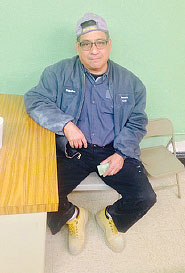
“El asunto es principalmente comercial; y básicamente Cuba ha estado en desacuerdo con una potencia económicamente principal — EE.UU. — por mucho tiempo. La política ha necesitado cambiar. Pero necesitan hacer un buen esfuerzo detrás de eso. La competencia de los países con Estados Unidos siempre ha estado del lado perdedor. Obama, es un tipo inteligente, así que él sabe que esto es sólo una buena economía”.
—Augustine Hávila
[divider]
Street talk: Changing U.S.-Cuban relations
By Jesus Lopez-Gomez
President Obama recently announced a thaw in the United States’ tense relationship with Cuba, a holdover from the days of old Cold War tensions. Obama’s announcement — which came with the exchange of political prisoners by both countries — marks an end to formal prohibitions on financial, diplomatic and cultural relations between the two countries.
For this edition of “Street Talk,” we at Dos Mundos engaged the public for people’s opinions on Obama’s pivot vis-a-vis Cuba. Here are their answers:
“It was getting to be time to change the no-contact and no-diplomatic-relations policy. Things are worse now than when I left Cuba (35 years ago). There is no clothing, (there are no) basic necessities. Everything is bought with dollars. And the average Cuban doesn’t have (a) dollar. (With regard to the pivot), there’s much work to be done still. For example, Cuba still doesn’t have a freedom level comparable to the U.S. The structure of the government still lends itself to an autocracy. Power will still be passed to familiar hands (as in the leadership transition from Fidel Castro to Raul Castro). If the oppression doesn’t change, everything will continue as it was.”
– Gilberto Acevedo –
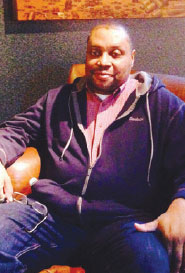
“I can only speak to the baseball world, but there’s (sic) been people that have been waiting for this to happen for a long time. I think they want to see this opened up even more than it is. This is, hopefully, building a bridge between the two countries. It’s surprising, but in spite of isolation, Cubans have continued to dominate world amateur baseball. They (are) just good. There’s … definitely (a) cultural connection (between the fate of Latinos and African Americans in baseball, as well as generally). I think as the MLB (Major League Baseball) wants to continue to broaden its interests and rebuild talent pools, they’ll invest in Cuban training centers, just like they’ve rebuilt their presence in the urban core. That’s the next story here.”
– Ray Doswell, vice president of curatorial services, Negro Leagues Baseball Museum –
“The issue is primarily commercial, and basically Cuba has been at odds with a primary economic power — the U.S. — for too long. The politics have needed to change. But they need to make a good effort behind it. Countries taking on the U.S. have always been on the losing side. Obama, he’s a smart guy, so he knows this is just good economics.”
– Augustine Havila –


